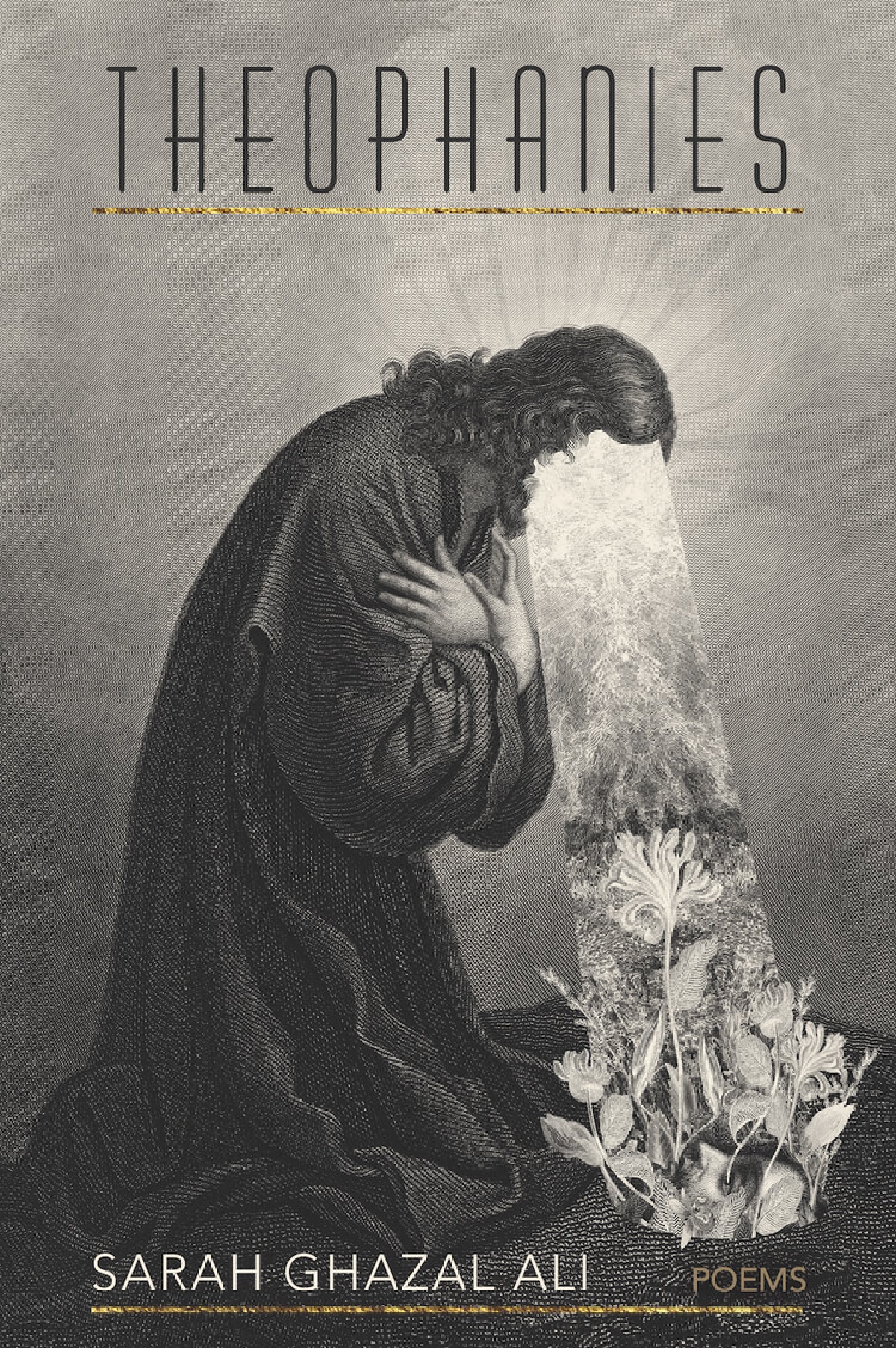
New Questions of Faith
Rainer Maria Rilke writes, “A work of art is good if it has arisen out of necessity. That is the only way one can judge it.” Theophanies is a book that seems to be whittled from the lifeblood of necessity itself. It is a book that is deeply faithful to its questions, asking: What is an honest act of creation? Who defines morality? What makes a story complete?
Theophanies is Sarah Ghazal Ali’s debut collection, which draws from Abrahamic traditions and texts to explore its questions. It is a quietly demanding collection, wielding language that is at once lush as it is pithy, and fierce as it is tender. It embodies these juxtapositions and contradictions with an ease that is reflective of the book’s essential nature: an act of radical reimagination. In “Daughter” Ali writes, “Do you think I asked to eavesdrop / through inherited eyes? / Recite to me a single memory not manufactured.” which encapsulates the necessity of imagination in this collection to counteract memory, which is not only fraught but has an agenda of its own.
In the same poem, Ali expands on the violence of a constrained memory while simultaneously calling in the possibility for a cellular level, inherited knowledge. She writes, “The rims of wounds have wounds / as well. I have a theory about mirrors / that doesn’t bear repeating. / The women who made me already know.” This line calls forth the importance of generational, matrilineal knowledge, and for me evokes the question: what is a theophany? By definition, a theophany is a manifestation or vision to humankind directly from God. The cover art of Theophanies provides an artistic interpretation of what a theophany may look like, but the collection itself complicates this by toggling between inherited matrilineal knowledge and divine knowledge from God. The line between the two blurs throughout the collection, and as I remember that the crux of a theophany is the act of bestowment, I see how this collection interrogates the very definition of divine.
In this exploration, Theophanies also asks the question of what it means to bear: witness, labor, knowledge, and children. In “Sarai”, Ali writes, “I am but do not have / a daughter. / When I look in the lake, / who looks back / is a little sister / self: O, little i, — I / carry you as you / carry who I am waiting to be.” In these lines, and throughout the collection, there is a continual turning back to this theme of bearing, and whether in bearing we are bestowed or if we are created. The act of motherhood is to create something that is both a part of you and is apart from you. Ali poses the question that the act of creation is both a fruition and a surrender. It is internally a deeply felt act of faith, springing from wells untainted by human interpretations of devotion. Yet by definition, the act of bringing forth life necessitates interactions beyond original intent, and in practice, this has ironically created an expectative burden on womanhood itself.
The imperative of this collection is to answer the unanswerable and name the unnameable, yet the collection seems keenly aware of its impossibility. The collection is humble with its questions, willing to remain in a state of continual arrival and to subvert the expectation of completion. Throughout, Ali turns to dreams, omens, and visions to fill in knowledge and stories that we know as a collective have existed yet cannot be known without a divine intervention. In the collection’s opening poem “My Faith Gets Grime Under Its Nails”, Ali writes, “Though excused, I wake / before the white thread of day— / break to open my window, / let the angels in”, which seems to implore divine witnessing and divine intervention for women who have been unfairly treated or judged.
The collection is strongest in bearing witness to the complication and unknowability of goodness, one of its central questions. One poem that beautifully contends with morality, which in Ali’s work is ultimately undefinable in absolute. In “Litany with Hair”, Ali uses form to instead illustrate how morality is specific to an individual, and ultimate “goodness” is knowledge that is imparted iteratively. In the poem, Ali can hear God speak, but the voice becomes convoluted by counter-narratives imparted from her mama and baba. In the poem, God, mama and baba are in opposition about the fate of the poet’s hair. Superficially, it is a conversation about the hair’s length, but a deeper conversation about purity and morality also emerges. The heart of the poem is the line “& God said you dislike a thing & I have placed good in it”, which dismembers the expectation that in the kingdom of morality, anything is either/or.
The vehicle of this collection is Ali’s polyphonic writing. The poems subvert the expectation of a singular, autobiographical speaker. Instead, Ali writes from a chorus of feminine perspectives, unwilling to yield to violent erasures of women throughout history. The poems resist the temptation to allow pre-written histories and parables to provide directives of faith. By naming the agendas of patriarchal narratives, the book achieves a more honest type of faith. It retraces the erasures and acts of violence throughout history on feminine bodies, countries, and lineages, and instead asks for a faith that is capacious in its ability to bear a matriarchal parable. Theophanies is remarkable precisely because of its ability to unravel the constraints of definitive morality. Instead, it lives in the land between directive and question, ushering in a new way to contend with faith.
Theophanies is available now from Alice James Books.